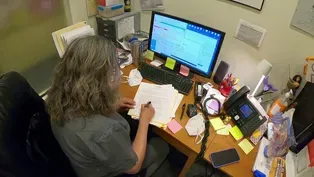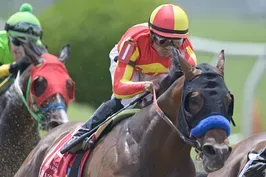
Native communities in Louisiana fight rising sea levels
Clip: 5/20/2023 | 8m 16sVideo has Closed Captions
Native communities in Louisiana fight to save their land from rising seas
In Louisiana, coastal erosion is claiming an average amount of land equivalent to a football field every hour. Some Native American communities in the southeastern part of the state are the hardest hit. Special correspondent Megan Thompson brings us the story of three Indigenous communities fighting to save their tribal lands.
Problems with Closed Captions? Closed Captioning Feedback
Problems with Closed Captions? Closed Captioning Feedback
Major corporate funding for the PBS News Hour is provided by BDO, BNSF, Consumer Cellular, American Cruise Lines, and Raymond James. Funding for the PBS NewsHour Weekend is provided by...

Native communities in Louisiana fight rising sea levels
Clip: 5/20/2023 | 8m 16sVideo has Closed Captions
In Louisiana, coastal erosion is claiming an average amount of land equivalent to a football field every hour. Some Native American communities in the southeastern part of the state are the hardest hit. Special correspondent Megan Thompson brings us the story of three Indigenous communities fighting to save their tribal lands.
Problems with Closed Captions? Closed Captioning Feedback
How to Watch PBS News Hour
PBS News Hour is available to stream on pbs.org and the free PBS App, available on iPhone, Apple TV, Android TV, Android smartphones, Amazon Fire TV, Amazon Fire Tablet, Roku, Samsung Smart TV, and Vizio.
Providing Support for PBS.org
Learn Moreabout PBS online sponsorshipJOHN YANG: In Louisiana, coastal erosion claims an average of a football field of land every hour.
Some Native American communities in southeastern Louisiana are the hardest hit.
Special correspondent Megan Thompson brings us the story of three indigenous communities fighting to save their land.
DEVON PARFAIT, Louisiana Tribal Chief, on Climate Change and Preserving Customs: Mama Mafin is buried all the way in the back right hand corner.
Who is my grandpa's mom.
MEGAN THOMPSON: At a small cemetery on Louisiana's Gulf Coast.
Devon Parfait pays respects to his native American ancestors.
He spent his early years here in Dulak, Louisiana, as part of the Grand Caillou Dulac Band of Biloxi-Chittimacha-Choctaw.
The tribe of nearly 1,100 people has been in the area for centuries.
But now Parfait's worried about its future.
DEVON PARFAIT: One of the biggest problems that whenever we have storms that come in, the storm surge that it brings will sometimes carry these coffins out.
And people will have to go out into the water and grab these coffins and bring them back.
MEGAN THOMPSON: The coffin that was once in this grave has disappeared.
Some of the tombstones that remain are deteriorating or turned upside down.
The destruction of this final resting place is just one part of a much bigger problem.
DEVON PARFAIT: This right here is the lot where I lived up until the second grade.
MEGAN THOMPSON: Parfait's childhood home was destroyed in 2005 by Hurricane Rita.
DEVON PARFAIT: I think about all that's been lost.
I mean, our culture, our heritage, the physical lands.
I think about the efforts going on now about coastal restoration and how they don't do enough for these communities who are living on the front lines here.
MEGAN THOMPSON: Parfait is now in a position to help change that.
DEVON PARFAIT: Great to meet you.
How you doing?
MEGAN THOMPSON: Last year, at age 25, he became the chief of his tribe.
He also earned a bachelor's degree in geoscience so he could study how much coastal land loss was affecting tribal communities.
DEVON PARFAIT: My research specifically was answering questions that other scientists didn't come down here to answer.
MEGAN THOMPSON: Parfait found that some tribal communities in this area are losing land at more than double the rate of the rest of coastal Louisiana because, he explains, tribes were pushed out to the farthest reaches of Louisiana's southeastern coast after the U.S. government forced them to relocate in the 1800.
DEVON PARFAIT: Even in my lifetime, I've noticed that the shoreline has encroached and moved further inland.
MEGAN THOMPSON: Parfait also has a new job working for the Environmental Defense Fund.
He's partnering with other tribal leaders and Louisiana State University to tackle one major cause of erosion the 27,000 abandoned canals dug over decades by the oil and gas industry that have sliced up the wetlands.
THERESA DARDAR, Pointe-au-Chien Indian Tribe: All the bayou's are getting wider.
MEGAN THOMPSON: Theresa Dardar and her husband Donald are members of the Pointe-au-Chien Tribe based in Montegut, 16 miles east of Parfait's tribal home.
They're working with Parfait to convince out siders that tribal land is worth saving.
THERESA DARDAR: Whenever we have meetings, I tell them we're the bumper, but if you don't protect us, next.
MEGAN THOMPSON: All of this used to be forest where Donald would hunt as a boy.
Now they're surrounded by water as far as the eye can see, the trees killed by salt water.
The Dardars blame the old canals, like this one, intersecting their bayou for allowing the ocean water in.
All this moving water also makes the shoreline erode faster.
THERESA DARDAR: It pretty much washes away that bottom and then eventually works its way up until it all falls into the water.
MEGAN THOMPSON: The oil and gas companies were supposed to fill the canals back in with soil, but the state stopped enforcing the requirement long ago.
So the Dardars and their partners secured over $550,000 in grants to start doing it themselves.
They hope this canal will be the first.
Research from Louisiana State University shows filling the canals back in repairs the land and is relatively inexpensive.
DONALD DARDAR, Pointe-au-Chien Indian Tribe: They got a muscle on there.
Two muscles, three muscles, four muscles.
MEGAN THOMPSON: Donald is leading another restoration project to protect the shoreline here.
He and a team from the Coalition to Restore Coastal Louisiana stack bags of oyster shells collected from local restaurants along the banks.
Over time, the barrier builds up as new oysters and mussels grow on top of the old shells.
DONALD DARDAR: The goal of this is for this to just keep growing and expanding.
Hopefully, they go bust through these bags and just keep growing.
MEGAN THOMPSON: Since 2019, they've built 2,400 foot reefs from about 400 tons of oyster shells.
During that time, the bank that isn't protected has eroded by several feet.
DONALD DARDAR: Since we didn't go no further with the bags, and right here, it eroded.
MEGAN THOMPSON: For the Dardars to have any hope of saving their land, these projects need to be done at a much larger scale.
Louisiana is already spending billions on its coastal master plan, an almost two decadelong effort to battle the rising seas.
But the Dardars feel left out.
THERESA DARDAR: We have to go on our own, looking for funds to try to save our community, because they're not.
MEGAN THOMPSON: The Dardars are fighting with another tribal leader, Rosina Philippe, to get more funding for resiliency projects and storm repairs.
For years, Philippe was president of the First People's Conservation Council, which advocates for tribes along Louisiana's coast.
She's also a tribal elder in Grand Bayou Village, 40 miles east of the Dardars.
It's a tiny indigenous community only accessible by boat.
ROSINA PHILIPPE, President, First People's Conservation Council: We've been inhabitants of Louisiana for many centuries.
Our whole lives tied around being on the coast and connecting to the water.
MEGAN THOMPSON: Damage from Hurricane Ida in 2021 is obvious everywhere.
ROSINA PHILIPPE: That dock is washed away and it needs to be replaced.
MEGAN THOMPSON: Homes are destroyed and boats lifelines for the community wrecked.
ROSINA PHILIPPE: I'm borrowing this boat today because my boat is still damaged from Ida.
MEGAN THOMPSON: Philippe's brother Maurice earns a living from fishing.
He also gives away hundreds, sometimes thousands of pounds of seafood each year to help feed his community.
But Hurricane Ida caused $25,000 worth of damage to his boat.
MAURICE PHILIPPE, Louisiana's Grand Bayou Indian Village: I've been having boats all my life, and this is supposed to be my last one, hopefully.
Seeing it the way it is right now is heartbreaking.
MEGAN THOMPSON: The Federal Emergency Management Agency, FEMA could help out.
Last year, it handed out more than $3 billion to victims of disasters.
But the National Congress of American Indians says federal money for security and emergencies isn't delivered evenly.
Tribal citizens receive only $3 for every $26 that nontribal citizens receive from the Department of Homeland Security, which houses FEMA.
ROSINA PHILIPPE: The government is paper heavy.
Paper.
It's not an indigenous concept.
It's not how we record time or events.
MEGAN THOMPSON: Tribe members often don't have documents like land deeds and home records that the government requires on top of it, many don't have basic computer skills, but the applications are all online.
So Philippe has helped create a program to train tribal members to navigate these complex government systems.
ROSINA PHILIPPE: We're trying to find a way to make the connection between who we are and what they expect.
MEGAN THOMPSON: Recently, a small victory.
After lobbying from Philippe and others, the Biden administration extended the deadline for Hurricane Ida relief in Louisiana to June 1st.
Philippe says the hard work is worth it because despite the challenges, her people will never leave.
ROSINA PHILIPPE: We have outsiders come here, and they see the lack and they see the loss.
We who belong here, we see what's still here, what's still viable, what still makes life in this region so precious.
We don't just survive here.
We thrive.
MEGAN THOMPSON: For PBS news weekend, I'm Megan Thompson in Grand Bayou Village, Louisiana.
The promises and potential pitfalls of AI’s use in medicine
Video has Closed Captions
Clip: 5/20/2023 | 6m 35s | The promises and potential pitfalls of artificial intelligence in medicine (6m 35s)
Racehorse deaths draw scrutiny of industry safety practices
Video has Closed Captions
Clip: 5/20/2023 | 5m 50s | Alarming spate of racehorse deaths draws scrutiny of industry safety practices (5m 50s)
Providing Support for PBS.org
Learn Moreabout PBS online sponsorshipSupport for PBS provided by:
Major corporate funding for the PBS News Hour is provided by BDO, BNSF, Consumer Cellular, American Cruise Lines, and Raymond James. Funding for the PBS NewsHour Weekend is provided by...












